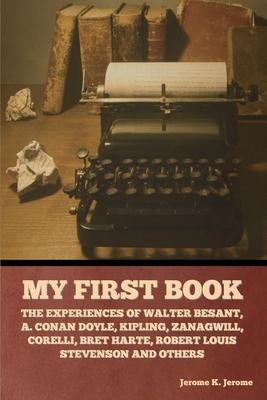My First Book: The Experiences of Walter Besant, A. Conan Doyle, Kipling, Zanagwill, Corelli, Bret Harte, Robert Louis Stevenson and

My First Book: The Experiences of Walter Besant, A. Conan Doyle, Kipling, Zanagwill, Corelli, Bret Harte, Robert Louis Stevenson and
This is a really interesting, peculiar book. It's a collection of essays by authors who were big (some bigger than others) in the late Victorian period. They're looking back on their first book, usually interpreted as their first publication. Some of the stories are absolutely wild, while others are interesting for being typical of the time.
One of the big takeaways for me was that 19th century publishing in London was a lot like Hollywood today. You had wannabes, scammers, hangers-on, all kinds of people who were attracted not by any attachment to writing as a discipline, but to the promise of money. The tenor of these stories is often wild and wooly. In Zangwill's essay, he talks about starting up a writing venture purely to make money, at a time when he was a student-teacher at a university. He was actually making a killing off of writing exploitative stories of the Jewish community he came from when the big-wigs of the university caught him out and threatened to expel him unless he stopped publishing.
Another author almost pays a publisher 100 pounds for the honour of being published, only to realize at the last second that she was being played. And the scammer after her money was a genuine, bona-fide publisher! It was just that in between publishing novels he genuinely expected to succeed, he charged would-be authors to print their bad novels.
The premises of a lot of these novels are pretty wild, too. This was the heyday of the sensation novel, and we get to hear some pretty sensational premises. I especially liked the plot to "Dead Man's Rock," a Stevenson rip-off about bloodthirsty pirates.
I should add that since this was also the heyday of British imperialism, we get some significant doses of that, too. H. Rider Haggard in Africa, Rudyard Kipling in India, and Morley Roberts in North America (including BC). The blithe, unconcerned way that colonialism is introduced by these writers can be pretty hard to take. I found Roberts' thoughts on the good it does a man to go to the frontier to be especially painful. In the long run, though, I think it provided me a good window into the mentality of colonialism, so I don't regret reading it.
All things considered, this is a great piece of social history which is also engaging on the level of gossipy chit-chat. (Sunrise)
PRP: 127.13 Lei
Acesta este Pretul Recomandat de Producator. Pretul de vanzare al produsului este afisat mai jos.
114.42Lei
114.42Lei
127.13 LeiLivrare in 2-4 saptamani
Descrierea produsului
This is a really interesting, peculiar book. It's a collection of essays by authors who were big (some bigger than others) in the late Victorian period. They're looking back on their first book, usually interpreted as their first publication. Some of the stories are absolutely wild, while others are interesting for being typical of the time.
One of the big takeaways for me was that 19th century publishing in London was a lot like Hollywood today. You had wannabes, scammers, hangers-on, all kinds of people who were attracted not by any attachment to writing as a discipline, but to the promise of money. The tenor of these stories is often wild and wooly. In Zangwill's essay, he talks about starting up a writing venture purely to make money, at a time when he was a student-teacher at a university. He was actually making a killing off of writing exploitative stories of the Jewish community he came from when the big-wigs of the university caught him out and threatened to expel him unless he stopped publishing.
Another author almost pays a publisher 100 pounds for the honour of being published, only to realize at the last second that she was being played. And the scammer after her money was a genuine, bona-fide publisher! It was just that in between publishing novels he genuinely expected to succeed, he charged would-be authors to print their bad novels.
The premises of a lot of these novels are pretty wild, too. This was the heyday of the sensation novel, and we get to hear some pretty sensational premises. I especially liked the plot to "Dead Man's Rock," a Stevenson rip-off about bloodthirsty pirates.
I should add that since this was also the heyday of British imperialism, we get some significant doses of that, too. H. Rider Haggard in Africa, Rudyard Kipling in India, and Morley Roberts in North America (including BC). The blithe, unconcerned way that colonialism is introduced by these writers can be pretty hard to take. I found Roberts' thoughts on the good it does a man to go to the frontier to be especially painful. In the long run, though, I think it provided me a good window into the mentality of colonialism, so I don't regret reading it.
All things considered, this is a great piece of social history which is also engaging on the level of gossipy chit-chat. (Sunrise)
Detaliile produsului









